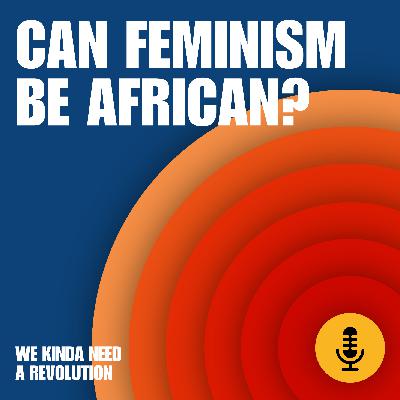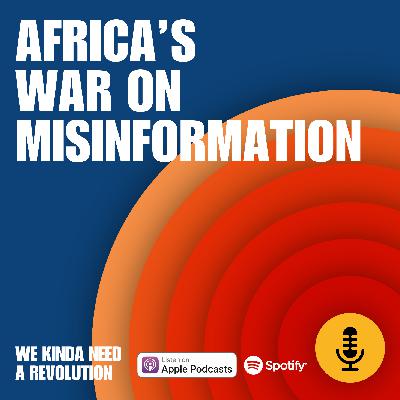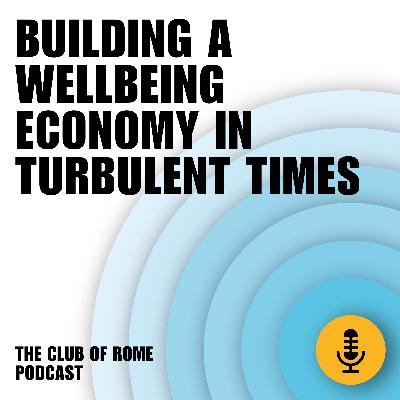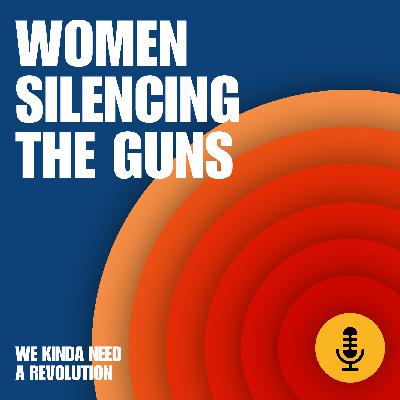Can feminism be African? With Minna Salami and Nolita Mvunelo
Description
What does freedom look like for African women in a world shaped by crisis, colonial legacies, and patriarchy? How does African feminism take shape across the continent, from urban political centres to rural communities? And is feminism rooted in African values, or has it too often been misrepresented and misunderstood?
In this episode Nolita Mvunelo sits down with Minna Salami, feminist author and social critic, to explore identity, liberation and justice. Together, they explore how African feminist thought can fuel planetary wellbeing, challenge patriarchy and imagine radically inclusive futures.
Watch the episode:
Full transcript:
Nolita: Welcome to 'We Kinda Need a Revolution', a special limited series of The Club of Rome Podcast where we explore bold, intergenerational ideas for shaping sustainable futures. I am Nolita Mvunelo, a Program Manager at The Club of Rome, and in this episode, I'm excited to be joined by feminist author, social critic and member of The Club of Rome, Minna Salami, the Program Chair at THE NEW INSTITUTE. Together, we unpack the central question of her powerful book and essay, Can Feminism be African, exploring how African feminism offers a unique lens to understand ideas of freedom, identity and power in a world shaped by crisis. We dive into class and generational tensions, the influence of colonial legacies and the personal experiences that inform Minna's vision of what it means to truly be free. Hi, Mina, how are you doing?
Minna: I'm very well. Thank you. How are you?
Nolita: I'm good. Thank you so much for joining us. What brought you to the work that you do?
Minna: I have always been someone who was very observant and opinionated at the same time, and from a very early age, one of the ways in which I expressed that was through writing. So already, as a child, I would write little columns in like my school magazine, and they were typically about topics that had to do with society, like I lived in Nigeria. So, you know, I wrote pieces about democracy in my country, or whatever, stuff like that. And so when I discovered the the technology of blogging in the early knots, I automatically and very spontaneously set one up. This was probably around 2006 and then that sort of evolved. And then in 2010 I launched my what became my blog, which I still have, called MsAfropolitan.
Nolita: One of the key essays that you wrote was about feminism being African. What is African feminism in your definition?
Minna: Well, African feminism is, by large, like all feminism in that it wants to abolish the patriarchy. You know, that is the key philosophy of all feminism, is that it is anti patriarchal and sees male dominance as something that is harmful and detrimental to social progress. And so I preface because it's important to understand that, you know, African feminism, in that sense, shares the same same intentions and motivations as all feminism does. What makes it specific is, of course, its connection to the continent. Patriarchy, you know, it looks and feels and operates in somewhat different ways in relation to Africa, which means, for example, that African feminism is concerned more with tradition than maybe a kind of white Western feminism might be. It is certainly much more concerned with fighting imperialism and neo colonialism, because these are things about the global order which have negative impacts on African women's lives. So African feminism, to sort of try to sum it up, which is a very difficult thing to do, is feminism that is concerned with all the many different issues that affect African women's lives, from patriarchy to tradition to imperialism to the global order.
Nolita: It's incredibly complex. I think reading some of your work and being a young African woman myself, a lot of it resonates with me. To your point that you're making about it being about questioning traditions, what types of traditions have you witnessed that made you think, actually, there's a bit of nuance here, and how do they show up in urban centers versus rural life? Because I noticed also in my own lived experience, that how a woman shows up in the rural space versus how I show up living in a city are very different. And so my expressions of who I am, my liberties and my freedoms are very much like in line with, as you said, imperialism and traditions, etc.
Minna: I mean, I think I should first of all say that I grew up in in the city in Lagos, so my experiences of rural Africa are limited. So, yeah, tradition in Africa, it's such a complicated and paradoxical space, because many of the traditions that may be harmful for African women's lives may also contain elements of empowerment. You know, because we are a continent whose history has so much been negated through the transatlantic slave trade, through the colonial narratives. We've lost so much of of our history, really, and with that, of course, also traditions. And there's something I think, quite empowering and enriching about recuperating many of those traditions. I mean, there's traditions, for instance, in Yorubaland, which is where my ancestry is, of women having, like female only, political alliances in which they would come together and reflect and then also strategize and have a real impact on the rulers, the kings and the chiefs of the particular communitie. And these traditions are, and were, of course, very empowering in some way, but at the same time, they were part of a patriarchal structure in which it was like in the Yoruba lineage, there has been one female Ooni. The Ooni is the sort of highest, the royal king of Yorubaland. So this is a very male dominant and patriarchal lineage. And so we can see with this tradition that, you know, it sort of gives women power to some extent, but it also sits within a kind of culture that is disempowering to women at the same time.
Nolita: Do you have any insight on how to go about handling these types of tensions? I mean, a crude way to say it is, like a criticism that I hear a lot, is this feminism thing, it's a Western thing. It's a white people thing. We have to honor our traditions and our culture. But how do we do both?
Minna: Yes, this is absolutely very much at the crux of African feminism and the African feminist movement, because since its inception in the 1970s as an explicit political movement for women's liberation in Africa and the diaspora, there has been a vast backlash against feminism in the continent. And the underlying argument, and of the backlash, is precisely this notion that feminism is not something that is, you know, home to Africa, it's a Western import. It's unAfrican you know, there's all these kinds of very harmful and ungrounded positions, that that that nevertheless have had a wide traction, but nevertheless so within African feminism, I mean, there's just been so many answers to your question, you know. And It really depends on which feminist you're speaking with which region they're in, as you asked previously, about like rural Africa versus urban Africa, I think the way in which we negotiate and negate space, valuing and even loving our indigenous traditions vis a vis how we, you know, respond to our real desires to express autonomy over our bodies, over our choices, over the ways that we think and live our lives. You know, there's really a tension there. You know, it's not an easy thing to there's no straightforward answer, in a sense, but I do think that it's very important to do the latter and and, and to the extent that indigenous traditions present obstacles to a woman being able to thrive and express agency, then I would choose the expression of agency, and maybe therein that's where there are possibilities to draw inspiration from indigenous traditions without maybe embodying them fully. I remember reading a very wonderful article by South African or Zimbabwean writer, Sisonke. I cannot pronounce her surname, Simang, I think it is pronounced something like that. But she writes about this kind of practice of the dowry at a wedding, you know, which is a very patriarchal practice, tradition. But she somehow, like, I can't remember the exact details, but she incorporates this into her wedding in a way that feels empowering and that is empowering. So, you know, there's a way to negate these, these spaces, I think
Nolita: I'd be very interested to read that on how to make it empowering, because that is very much a tradition that's still practiced in my culture. And there have been, like, incredibly heated debates about that, about why are we still buying women? Or, you know, whatever perception there is, how are we forging pathways towards the future without spending too much time venerating the past? Which brings me to my question about African feminism as an opportunity to bring forth while being on a healthy planet. Is there a connection between the those two things, and what are the opportunities that it presents for for us?
Minna: Our planet and our environment is absolutely one of the very important issues for African feminism at large. Because for one, you know, Africa contributes, I think it is 2% it's like between 2 and 5% of global warming, right? I mean, and yet, the continent is so much impacted by what happens, you know, to our climate and from other continents, contribution to global warming. And so climate change impacts African women's lives detrimentally. Women in the continent are responsible for so much of agriculture and farming, and you know, all of the the professions that are related to the land. And so climate change, of course, you know, is impoverishing a lot of women in the continent. And yet, at the same time, there's this cultural narrative about how you know women generally, but specifically African Women's bodies are just so much connected to the soil. You know, there's this really romantic imagery about Mot
























